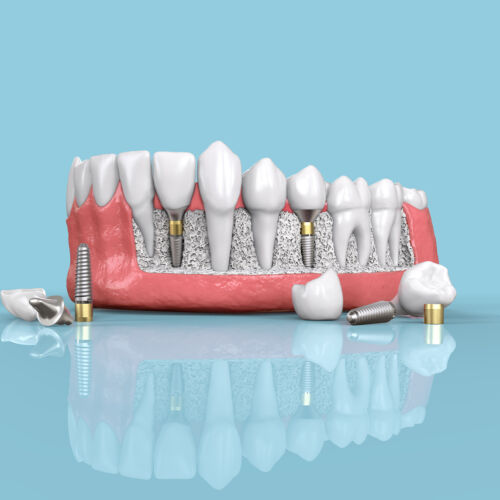Titanium is used in a variety of health care applications, and particularly in the last few decades, in dental implants. Just like dental mercury amalgam, this material was thought to be inert, and biocompatible for human use. Also, like dental mercury amalgam, these implants consist of a mixture of metals that can have toxic effects. New research is being published around the world showing that these implants corrode and their particles and ions can be distributed throughout the body, far from the implant site. This can lead to toxic reactions and failure of the implant itself. Patients are not being informed of the potential risks that can occur when having dental implants used to replace a root canal tooth, or an extracted tooth.
It is important that both medical and dental health care professionals recommend biocompatibility testing be done prior to any dental restorative treatment for the patient. This is especially important to have a heavy metal test done for people who have a history of allergies, be tested prior to implant placement to avoid failure due to an allergic reaction to Ti or other metals. There are very serious considerations that need to be addressed with metals that are commonly used in dental restorative treatments, like nickel crowns and bridges, dental mercury amalgam fillings, or aluminum, and also if the patient has metal joint prostheses, these can all create galvanic corrosion and result in metal toxicity, as well as implant failure.

According to the American Dental Association, there are over 5 million dental implants placed each year in the United States. The dental implant market size was valued at 4.6 billion US dollars in 2019, expecting to continue its upward trend. It was noted that there are 2 types of dental implants in the global market place, Ti and zirconium, however, Ti has the largest share of the market. It was also noted that Ti dioxide is very toxic for the human body and needs to be removed from the Ti implants. Since the field of implantology has exploded globally in the last decade, as a replacement of root canal treatments as well as missing teeth, it is only now really being studied as to the true health impacts and potential risks associated with these implants.
Titanium Exposure and Human Health
by Anita V. Tibau, Blanche D. Grube et al. (2019)
ABSTRACT
Historically, titanium (Ti) has maintained the reputation of being an inert and relatively biocompatible metal, suitable for use in both medical and dental prosthesis. There are many published articles supporting these views, but there is recent scientific evidence that Ti, or its corrosive by‐products, may cause harmful reactions in humans. It is important for all medical and dental professionals to understand the implications, complexities, and all potential pathways of exposure to this metal. These exposures are not only from the environment but also through various commonly used products in medicine that are often completely overlooked. These external (intermittent) and internal (constant) exposures have an impact on whole‐body health. This review examines possible harmful effects, risks, and often ignored potential complications of Ti exposure to human health. LINK to full paper.

